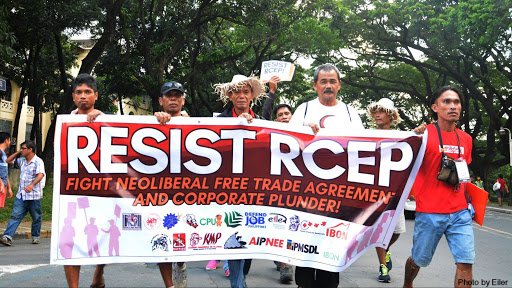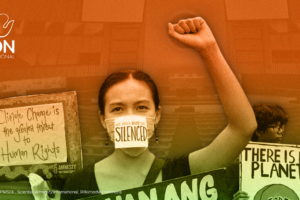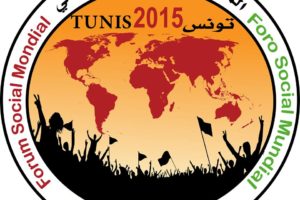The RCEP and other trade negotiations must be stopped as governments and citizens must put all their efforts towards saving lives and addressing the pandemic that has been ravaging communities.
Amidst the coronavirus disease (COVID-19) pandemic, Asia Pacific countries involved in the Regional Comprehensive Economic Partnership (RCEP) negotiations, are continuing talks via videoconferencing, which started on April 7 and will continue on from April 20 to 24. Likewise, trade negotiations among members of the World Trade Organisation (WTO) have also been continuing through virtual technologies despite the cancellation of the ministerial meeting in June in Kazakhstan. On April 17, a virtual meeting was held by the WTO secretariat and members to discuss the viability of online discussions and written procedures to continue WTO work and decision-making during the COVID-19 lockdown.
As early as March 2020, as China has started to curb COVID-19, the Chinese Ministry of Commerce announced that it will continue working with the other negotiating parties towards signing the RCEP deal within the year. Citing the importance of continuing economic activity through international trade as key to post-pandemic recovery and to avoid the worst of the impending global recession, RCEP member states want to finish the legal scrubbing of the text by July, so that the agreement can be finally signed later in the year at the ASEAN Summit in Vietnam.
Continuing the negotiation of neoliberal trade deals is not a solution to the ailing world economy, and much worse, has the potential to aggravate the underlying inequalities that have caused poor populations to suffer disproportionately from the pandemic.
The RCEP and other trade negotiations must be stopped as governments and citizens must put all their efforts towards saving lives and addressing the pandemic that has been ravaging communities. The conduct of trade negotiations over videoconferencing and other virtual means, away from public scrutiny and without participation from civil society and affected communities, only reinforces the secretive and undemocratic character of these trade deals. Moreover, continuing the negotiation of neoliberal trade deals is not a solution to the ailing world economy, and much worse, has the potential to aggravate the underlying inequalities that have caused poor populations to suffer disproportionately from the pandemic.
Decades of neoliberal trade deals such as the Agreement on Agriculture (AoA) of the WTO and the North America Free Trade Agreement (NAFTA), and many other bilateral and multilateral trade and investment agreements, have already resulted in the destruction of local food systems and poverty among the food producers in the global South because of dumping and reliance on food imports. Trade and investment deals have also facilitated the spread of global production networks and value chains which drove the relentless extraction of raw materials from the global South, leaving them with environmental destruction, and exploited cheap labour in poor countries under depressed wages, dangerous working conditions, and without rights to form unions. The WTO’s agreement on the Trade-Related Aspect of Intellectual Property Rights (TRIPs), even with its flexibilities, has enabled market monopolies for pharmaceutical giants, leading to inaccessible medicines.
New agreements such as the RCEP, as well as those of the WTO, on further bringing down tariffs, for intellectual property protection, liberalising investments, government procurement, and digital trade/e-commerce, will only cement, if not worsen the negative impacts of neoliberal trade. In particular, RCEP intellectual property provisions that go beyond TRIPs extend patent terms, allowing pharmaceutical giants to expand and introduce new monopolies. Generic drugs competition, which could help patients’ and treatment providers’ access to affordable medicines, are also undermined in certain provisions. As pharmaceutical companies scramble to develop a vaccine for COVID-19, rules that prevent poor people’s access to medicines will cost more lives.
Meanwhile, workers suffer the lack of social protection during the pandemic, alongside job losses from global production and supply chain disruptions, amid lockdowns and closures of export-oriented manufacturing companies. While talks on improving e-commerce, to “fight poverty” and “widen workers’ options,” get increasingly popular during the lockdowns, allowing corporations to write the rules for a liberalised digital trade will not only ensure more corporate market access at the expense of small businesses, but will also contribute to the further erosion of workers’ rights in the rise of digital services platforms that maximise workers’ labour but do not provide for their social protection through health benefits, unemployment insurance, pension, among others.
Allowing corporations to write the rules for a liberalised digital trade will not only ensure more corporate market access at the expense of small businesses, but will also contribute to the further erosion of workers’ rights…
The pandemic has laid bare how neoliberal hyperglobalisation has damaged countries’ local food systems and self-sufficiency. While food shortages occur in cities, farmers suffer too as they cannot tend to their fields and get their products to consumers due to strict travel restrictions. In some countries, corporations have taken advantage of the quarantine measures to continue grabbing lands from farmers. In the Philippines, for example, mining and real estate companies have infringed on farmers’ lands in the middle of the quarantine. In Brazil, cattle ranchers and grileiros[1] have taken advantage of the lessened capacity of the government and Indigenous Peoples (IP) to patrol their lands to illegally seize protected lands. Signing measures to further bring down agricultural and other tariffs, and liberalise investments that would facilitate more exploitation of natural resources, will harm not only farmers and IP communities but will also further endanger developing countries’ food security.
The pandemic has laid bare how neoliberal hyperglobalisation has damaged countries’ local food systems and self-sufficiency. While food shortages occur in cities, farmers suffer too as they cannot tend to their fields and get their products to consumers due to strict travel restrictions.
CSOs and people’s organisations have voiced their opposition to the ongoing virtual trade talks. More than 200 organisations signed a civil society letter urging trade ministries and the WTO to stop all trade and investment treaty negotiations during the COVID-19 outbreak and refocus on access to medical supplies and saving lives.
The current unequal and undemocratic global trade regime must be replaced with a regime that fosters complementarity and solidarity within and among nations, and that upholds peoples’ right to development. “Business as usual” trade agreements must be discontinued. The COVID-19 pandemic serves as a wakeup call that now is the time to reject neoliberal trade agreements and build a trade regime that protects both the people and the planet. #
[1] Individuals who illegally seize protected lands from Indigenous Peoples.




